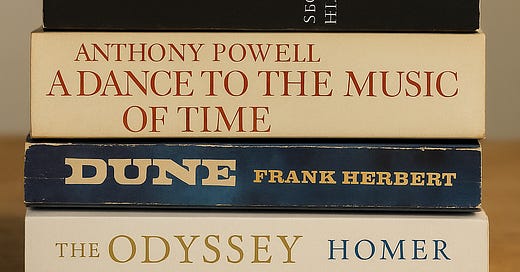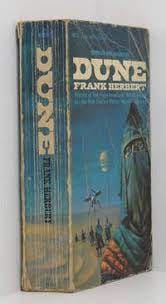If it’s worth reading, it’s probably worth re-reading
To re-read is to grow, to challenge one’s assumptions, and to keep alive the spirit of aesthetic and intellectual inquiry.
“Real reading is rereading.” Harold Bloom, How to Read and Why
There’s a particular kind of revelation that arrives not in the first encounter with a text, but in the second. Or the third. Or the thirteenth.1 It is the thrill of discovering that what you thought you’d already understood still contains multitudes. That a book you believed you knew now glints with fresh meaning, like light striking a familiar surface from a different angle.
A few months ago I posted an essay called Serious reading: how to read with attention and insight. (If you’ve not read it, I still think it’s the best thing I’ve written on here.) In it I included a short section on re-reading:
There is always more in great literature than we can see on a single reading. More than we can probably see after a lifetime of re-reading. Knowing that this depth is there, that we can look for it and, on discovery, marvel at its presence and wonder to what extent it was placed there deliberately. … To re-read is to grow, to challenge one’s assumptions, and to keep alive the spirit of aesthetic and intellectual inquiry.
Harold Bloom, the curmudgeonly high priest of literary criticism, insisted that rereading is not just important but essential. Reading a great work once, he argued, barely counts. It is through re-reading that we enter into what he called the “struggle between the reader and the text.” Every return is both a deepening and a renewal. Not only does the text shift under scrutiny, but so too do we. As with Heraclitus’s observation that you can never step into the same river twice, a book is never the same when reread. Or at least, we are never the same reader twice.
Bloom believed that great literature resists easy understanding. A single reading may skim the surface, but the real work begins when we return. It is in rereading that meaning deepens, contradictions emerge, and the full weight of a text begins to reveal itself. For Bloom, this process is not academic but personal. To reread is not simply to go back over old ground; it is to rediscover, to reflect, and, in a sense, to remake the self. The pleasures of reading, he argued, are private pleasures. They are selfish in the best sense: a cultivation of inner life. Over time, the books we return to become a kind of mirror. They form what Bloom called a personal canon, not the texts we are told to value, but the ones we find ourselves unable to leave alone.
Canon-making, at its best, isn’t about reverence or received wisdom. It’s not a list handed down from on high, nor a curriculum etched in stone. It’s a personal, evolving map of meaning, shaped not by obligation, but by fascination. I love the idea that the books that form our canons are the ones that refuse to let us go. We re-read them not because we must - we’ve already ticked them off - but because they continue to speak, even as we change.
It is through repeated acts of attention that, over time, these books become our inner furniture. We start to think with them. They supply analogies, rhythms, ways of seeing. They shape taste—not in a prescriptive way, but by quiet accumulation. As Bloom puts it, we read to find our own “heightened individuality,” and the canon we assemble is both the record and the engine of that discovery.
So, in this spirit, I want to share some of the books that find myself returning to again and again. There are many other books on my re-read pile but these are, I think, representative.
Dune, Frank Herbert
Since Denis Villeneuve’s recent remakes I’m sure many more readers will have found their way to Dune. Fair warning: if you don’t like sci-fi, you probably won’t like this either. Even if you do like sci fi it may not be for you: it’s not just spaceships and sand worms, it’s dense, philosophical, and often bewildering. At least, it was to me when I discovered it on my dad’s bookshelf aged 11 or 12.
I’d already devoured a fair bit of sci-fi by then, but I’d never read anything like this. I was instantly transported to a world that felt utterly alien. The spaceships weren’t sleek steeds ridden through space, they were vast and ponderous. Lasers barely worked. Technology was mysterious, ancient, almost magical. I didn’t understand half of what was going on - the politics, prophecy, ecological metaphors - but I was gripped by the story of a boy destined to become something more than human.
Since then, I’ve reread Dune five times, and each return reveals more. What once seemed like a straightforward hero’s journey now reads more like a warning. Paul Atreides, the messianic figure at the heart of the novel, is no mere saviour. He is a weapon. Herbert’s narrative is soaked in irony: the prophecy is a trap, religion is a tool of control, and destiny is indistinguishable from manipulation. On first reading, I followed Paul’s ascent with awe. By the fifth, I dreaded it.
Part of Dune’s appeal lies in the depth of Herbert’s world-building; it’s not just elaborate, it’s epistemological. Each faction, each tradition, has its own way of seeing, its own version of truth. The Bene Gesserit manipulate through memory and voice. The Fremen see through sand and myth. The Spacing Guild sees the future in terms of probability. It becomes a meditation on knowledge, power, and belief.
One of its most distinctive and unsettling features is Herbert’s indiscriminate, almost promiscuous, use of free indirect discourse. Almost every character, major or minor, is given interiority. We slip without warning from Paul’s prophetic dread to Jessica’s maternal doubt, from Baron Harkonnen’s grotesque calculations to a mentat’s cold probability. In lesser hands, this would be confusing but here it becomes a kind of textual ecology, a choral narrative in which the voice of the novel is not one voice at all, but a shifting, murmuring polyphony. The omniscient narration dissolves into a compiler of transcripts, a chronicler of partial minds caught in the momentum of history.
In this sense, Dune resists the clean architecture of a hero’s journey. It’s more like a hallucinated symposium in which every speaker, even the mad and the marginal, gets their say. The language becomes a kind of polyglot village chorus - a ventriloquist’s act - with each voice shaping the feel of the world Herbert’s created.
But all this is at risk of sounding a bit pompous. I don’t want to argue Dune is great literature - it isn’t but it is a great read. I think with this first entry into my personal canon, re-reading is more about comfort than it is about finding new perspectives or discovering new things about myself. I’ve grown up with it and still appreciate it each time I pop back.
Keep reading with a 7-day free trial
Subscribe to David Didau: The Learning Spy to keep reading this post and get 7 days of free access to the full post archives.





